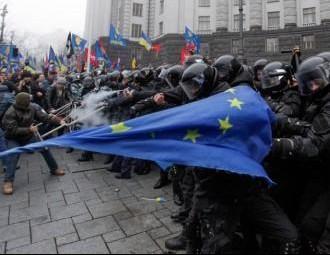Ulad Vialichka: Ukrainian situation is worst case scenario for everyone, including Belarus

Yet another wave of EU-Russia geopolitical confrontation spread all over Ukraine. Among the victims are the Ukrainian National Platform of the EaP CSF and national civil society organizations.
Belarusan National Platform of the Eastern Partnership Civil Society Forum (EaP CSF) expressed solidarity with Ukrainian colleagues on the eve of the third summit of the Eastern Partnership in Vilnius.
“We express our sincere solidarity and support to Ukrainian National Platform of the EaP Civil Society Forum and in through it - to all the Ukrainian civil society organizations actively working for the benefits of their country towards European integration”, - says the Statement of the National Platform. The Statement also condemned “involvement of third countries in the definition of the political course of Ukraine and other countries of the Eastern Partnership”, as well as appealed “to keep all the possibilities for Ukraine in the near future to sign an Association Agreement” and “continue previously chosen course of European integration, also within the framework and mechanisms of the Eastern Partnership”.
EuroBelarus Information Service asked Ulad Vialichka, the chairperson of the Coordination Committee of the National Platform of the EaP CSF, the head of the International Consortium “EuroBelarus”, to comment on the consequences of the Eurointegration demarche for the Ukraine’s civil society.
- Was the suspension of the Association Agreement with the EU a severe blow for theUkrainian National Platform of the EaP CSF?
- For a number of years we’ve been observing how the organizations of the Ukrainian National Platform within the Eastern Partnership framework have been working. Ukrainian National Platform united those civil society organizations which found it very important to sign the Association Agreement with the EU, which means that it is a severe blow for the work of the civil society in the country.
In due time Ukrainian National Platform was actively discussing the European prospective for Ukraine after the arrest of Julia Timoshenko. Some organizations assumed there can be no question of maintaining contacts with the government; some took opposing views.
Unfortunately, the refusal, or a temporary moratorium of the Ukraine’s government to sign the Association Agreement means the loss for all the parties.
- What can the Ukraine’s civil society contrast to the government? Can it urge the Ukrainian government to reverse its policy?
- It is only people’s indignation and protest actions that can be opposed to the government. Ukrainian National Platform has openly supported Ukraine’s protest actions in its statement. And a lot of members of civil society organizations are among the protesters now.
- How will Ukraine’s decision affect the Eastern Partnership program in general?
- Current Ukrainian situation is the worst case scenario for everyone, including Belarus. The example of Ukraine, the country, which haven’t stood apart from European rhetoric and undertook certain steps towards closer relations with the EU shows that even the countries that are most advanced in Eurointegration are unable to make right decisions, not to speak of countries where Eurointegration processes are going on at a much slower pace.
While introducing Eastern Partnership, European Commission has always stressed that it is not some anti-Russian initiative, but rather a program aimed at cooperation. The development of the Ukrainian situation indicates that yet another wave of EU-Russia geopolitical confrontation is being spread over Eastern Europe. We see that both the parties accuse each other of dishonest game; however, it turns out that the states subject to outside influence suffer most.
Eastern Partnership is a program that is being implemented in competitive environment. Beside internal problems, we feel influence of the external factors; that is of two confronting centres: one is aimed at growth and development, though suffering from crisis, and is called European Union; the other is Moscow-based post-Soviet reincarnation.
-
03.01
-
07.10
-
22.09
-
17.08
-
12.08
-
30.09








































